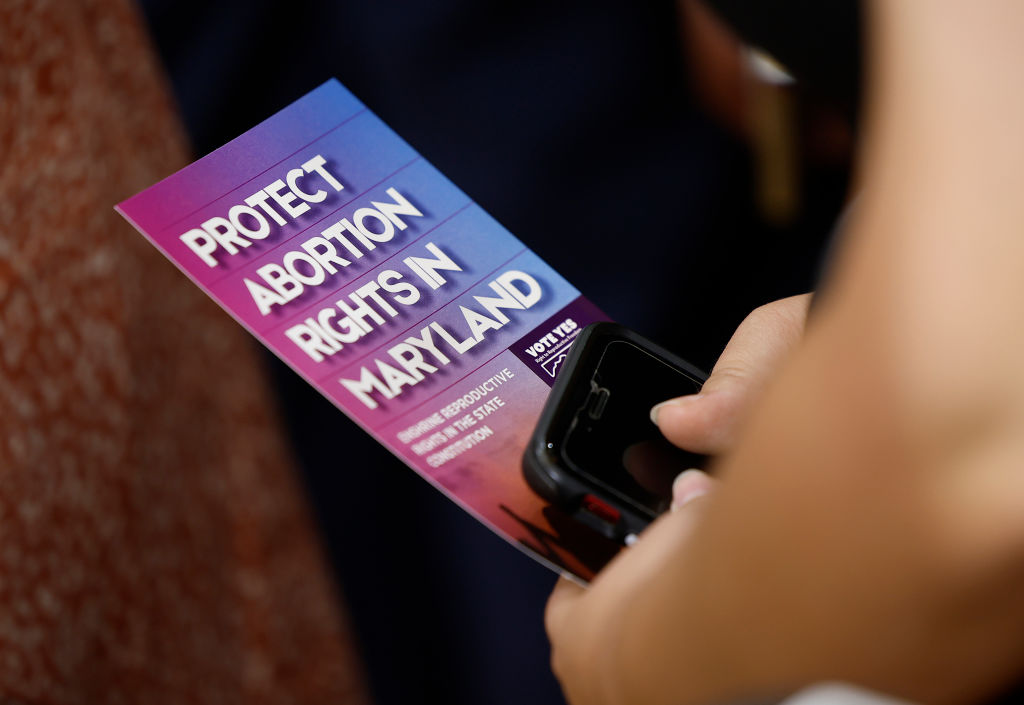Two years after the U.S. Supreme Court upended 50 years of abortion law with its Dobbs decision, Maryland has reaffirmed its position as an abortion-friendly state while other states have restricted or banned the procedure outright.
Providers in Maryland say they have seen an increase in patients, including an influx from states with restrictive laws. Voters will consider an amendment to the Maryland Constitution this fall that would guarantee reproductive rights, and the question of abortion is expected to have an outsized role in the race for the state’s Senate seat.
But advocates realize that even in abortion friendly states such as Maryland, the landscape could shift at any time — perhaps as early as this week when the Supreme Court is expected to rule on whether federal law overrules state law on emergency abortions.
“I’m waiting, kind of like ,‘Here comes the next blow.’ You just kind of sit and wait for the next thing,” said Sharon Blugis, executive director for Reproductive Justice Maryland.
It’s a far cry from some states that all but banned abortions after the court handed down Dobbs v. Jackson Women’s Health on June 24, 2022. That ruling reversed Roe v. Wade, the 1973 decision that recognized a federal right to an abortion, and said that abortion law should be left to the states.
What has emerged is a patchwork of laws that vary state-to-state. On the two-year anniversary of the Dobbs, Planned Parenthood of Maryland President and CEO Karen J. Nelson thinks it’s a “good day to reflect” on where the nation is on abortion access.
“Where you live should not determine what kind of health care that you receive. And we have created a very large inequity across this country in providing care for those who need it,” she said.
Refuge for out-of-state abortions
The Guttmacher Institute, which provides nationwide abortion analysis, estimates that in 2023 there were a total of 38,590 clinician-provided abortions performed in Maryland, more than 4,000 for patients who came from other states.
Nelson said that in the first year post-Dobbs, Planned Parenthood clinics across Maryland saw a 40% uptick in patients compared to the previous year. And across their network, they continue to see out-of-state abortion patients.
“We see, just in Planned Parenthood, 13% of our patients are from out of state,” she said. “Some of it is what you would expect, that neighboring states and especially West Virginia, where there’s a total ban. But then you have a lot of people coming from Texas.
“The numbers that are increasing the most are the Florida folks,” Nelson said. “Where we just saw, in the past, maybe one or two patients from Florida a month, that is increasing exponentially right now.”
In April, the Florida Supreme Court allowed a controversial ban on abortions after six weeks to take six-week abortion ban to go into effect. Nelson believes that the six-week ban, which took effect in May, is contributing to the influx of patients from Florida to Maryland Planned Parenthood facilities.
‘Holding our breath’ on U.S. Supreme Court cases
Last week, the U.S. Supreme Court dismissed a case that could have limited access to a drug called mifepristone, a drug commonly used in medication abortions, saying that the anti-abortion doctors and organizations who brought the case did not have standing to do so.
The case called into question the safety of mifepristone after the Food and Drug Administration relaxed regulations in 2016 to make it easier for the drug to be prescribed and taken.
Abortion-rights activists cautiously celebrated the ruling, but expect that new cases challenging the drug would arise in the future. Anti-abortion organizations also expect to see future challenges.
“The justices did not rule on the substance of the case at all. They ruled on the issue of standing,” said Jeffrey S. Trimbath, president of the Maryland Family Institute.
“And it will come back. The substance of it will be decided. This just wasn’t the right vehicle. You win, some you lose some,” he said.
Now both anti-abortion organizations and reproductive rights advocates have turned their attention to an upcoming U.S. Supreme Court decision that could allow emergency rooms to refuse to provide emergency abortions even in the case of severe, life-threatening pregnancy complications.
Moyle v U.S. challenges the federal Emergency Medical Treatment and Labor Act, shortened to EMTALA, a 1986 law that ensures “public access to emergency services regardless of ability to pay,” according to the Centers for Medicare and Medicaid Services (CMS).
In July 2022, CMS sent a letter to hospitals across the United States stating that EMTALA preempts state laws that ban or severely restrict abortion in cases where an emergency abortion is necessary to “stabilize” patient’s medical condition. Under EMTALA, doctors can perform abortions in such circumstances, the letter said.
But the state of Texas sued the federal government over what it called the Biden administration’s effort to “transform every emergency room in the country into a walk-in abortion clinic.” That case is currently in the 5th U.S. Circuit Court of Appeals.
The Supreme Court is expected to rule this week on another challenge to EMTALA, from Idaho. In that case, it was the Biden administration that sued the state, for abortion laws that are too narrow for doctors to perform an abortion to stabilize a patient if needed, as EMTALA requires.
In Maryland, advocates worry that separating emergency abortions from EMTALA could give the state’s religiously affiliated hospitals and emergency rooms the ability to refuse to provide emergency abortions.
“We’re focused on the coming decision on EMTALA, but I think we’re kind of holding our breath on that one, I don’t have a lot of faith on what’s going to come down,” Blugis said.
Abortion on the ballot
The abortion question also plays a role in the race for the state’s available U.S. Senate seat, as former Republican Gov. Larry Hogan attempts to convince Maryland’s largely Democratic voters that he supports Roe-style abortion protections.
Meanwhile, his Democratic opponent, Prince George’s County Executive Angela Alsobrooks, is trying to convince voters not to trust Hogan’s stance on the matter.
In addition, Marylanders will get to decide if the state constitution should enshrine the right to receive an abortion and determine other reproductive decisions.
In 2023, the General Assembly voted to put the “Right to Reproductive Freedom” amendment on the 2024 ballot. The change would protect “the ability to make and effectuate decisions to prevent, continue, or end one’s own pregnancy.”
Blugis said that her main priority is to collaborate with other reproductive health clinics and advocates to push an information campaign about the ballot question, urging voters to approve the constitutional amendment.
Anti-abortion groups are urging Marylanders to reject the ballot initiative, saying that the measure would eliminate health and safety regulations and argues that the amendment threatens a parent’s right to make medical decisions for their kids.
Blugis says the amendment is an opportunity to for Marylanders to defend reproductive freedom in the state as the rest of the nation turns into a patchwork of laws and regulations on abortion access.
But some are not as confident.
In 2021, Layla Houshmand, was eight weeks pregnant when she experienced a medical emergency. Doctors would not provide treatment for that condition while she was pregnant for fear of endangering the fetus. But even in pre-Dobbs Maryland, she said she struggled to secure an abortion.
Houshmand, now 37, worries that state guarantees for reproductive freedom would provide little protection if anti-abortion politicians at the federal level limit abortion access.
“We’ll take what we can get. It’s a positive thing. I’ll vote in favor of it,” she said of the Maryland constitutional amendment. But with the possibility of an anti-abortion Congress that could push fetal personhood laws, “all of that might not matter.”
“Once you have embryos having the same kinds of … rights as living, breathing people, the game’s over,” Houshmand said. “It doesn’t matter what your state law is.”



